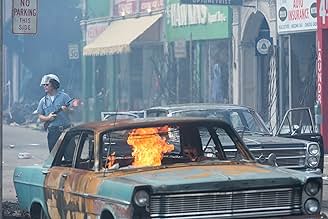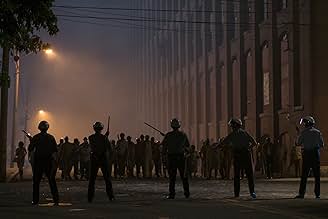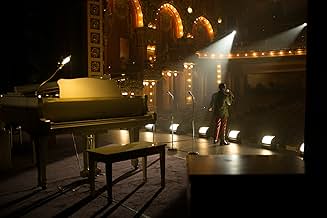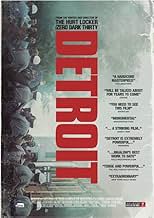AVALIAÇÃO DA IMDb
7,3/10
58 mil
SUA AVALIAÇÃO
Um drama baseado em eventos ocorridos durante os motins de Detroit em 1967, no qual um grupo de policiais desonestos responde a uma queixa com retribuição em vez de justiça em suas mentes.Um drama baseado em eventos ocorridos durante os motins de Detroit em 1967, no qual um grupo de policiais desonestos responde a uma queixa com retribuição em vez de justiça em suas mentes.Um drama baseado em eventos ocorridos durante os motins de Detroit em 1967, no qual um grupo de policiais desonestos responde a uma queixa com retribuição em vez de justiça em suas mentes.
- Direção
- Roteirista
- Artistas
- Prêmios
- 5 vitórias e 21 indicações no total
Joshua Olumide
- Dave
- (as Tokunbo Joshua Olumide)
Avaliações em destaque
'DETROIT': Four and a Half Stars (Out of Five)
The new crime drama based on the racially charged Algiers Motel incident, during the 1967 12th Street riot in Detroit (the film was released to commemorate the 50th anniversary of the horrific incident). The movie was directed by Kathryn Bigelow, and it was written by acclaimed journalist/screenwriter Mark Boal (the duo also performed the same duties on both 2008's Best Picture winner 'THE HURT LOCKER', and 2012's Best Picture nominee 'ZERO DARK THIRTY'). The film stars John Boyega, Will Poulter, Algee Smith, Jason Mitchell, Jacob Latimore, Hannah Murray, Kaitlyn Dever, Jack Reynor, Ben O'Toole, John Krasinski and Anthony Mackie (who also costarred in 'THE HURT LOCKER'). It's received almost unanimous positive reviews from critics, and it's also a modest hit at the Box Office as well. I found it to be extremely well made and involving.
The film begins with a police raid of a private party, in 1967 Detroit, which then resulted in multiple days of rioting. The story then centers on a police raid of the Algiers Motel, on July 25th, where police believed a sniper fired on them from. The raid resulted in the terrorizing of several black suspects, and two white women, and the deaths of some of those involved. The story then shifts to the court room battle that followed the incident.
The movie is interesting, and pretty intense, from pretty much the opening scene until the last. All of the performances are good in it as well, and of course Bigelow's direction is almost flawless. For me the film was also very educational, as I knew very little about these events in history (prior to seeing the movie). I think the film is yet another great example of what a talented filmmaker Bigelow is, and obviously her and Boal make a great team together too. It's also cool to see Boyega in another strong starring role; a 'STAR WARS' actor that's actually making a name for himself (outside of the franchise) is always good to see.
Watch our movie review show 'MOVIE TALK' at: https://youtu.be/W6So6Kz52VQ
The new crime drama based on the racially charged Algiers Motel incident, during the 1967 12th Street riot in Detroit (the film was released to commemorate the 50th anniversary of the horrific incident). The movie was directed by Kathryn Bigelow, and it was written by acclaimed journalist/screenwriter Mark Boal (the duo also performed the same duties on both 2008's Best Picture winner 'THE HURT LOCKER', and 2012's Best Picture nominee 'ZERO DARK THIRTY'). The film stars John Boyega, Will Poulter, Algee Smith, Jason Mitchell, Jacob Latimore, Hannah Murray, Kaitlyn Dever, Jack Reynor, Ben O'Toole, John Krasinski and Anthony Mackie (who also costarred in 'THE HURT LOCKER'). It's received almost unanimous positive reviews from critics, and it's also a modest hit at the Box Office as well. I found it to be extremely well made and involving.
The film begins with a police raid of a private party, in 1967 Detroit, which then resulted in multiple days of rioting. The story then centers on a police raid of the Algiers Motel, on July 25th, where police believed a sniper fired on them from. The raid resulted in the terrorizing of several black suspects, and two white women, and the deaths of some of those involved. The story then shifts to the court room battle that followed the incident.
The movie is interesting, and pretty intense, from pretty much the opening scene until the last. All of the performances are good in it as well, and of course Bigelow's direction is almost flawless. For me the film was also very educational, as I knew very little about these events in history (prior to seeing the movie). I think the film is yet another great example of what a talented filmmaker Bigelow is, and obviously her and Boal make a great team together too. It's also cool to see Boyega in another strong starring role; a 'STAR WARS' actor that's actually making a name for himself (outside of the franchise) is always good to see.
Watch our movie review show 'MOVIE TALK' at: https://youtu.be/W6So6Kz52VQ
As the first film to be distributed and released by Annapurna, Detroit tells the story about what happened during the 1967 riots, specifically the one in Detroit that put the city on the map and drove the population down from its highs back when Detroit was the Motor City. The acting, direction, music, and pace of this movie is well done and should've gotten Oscar love.
This film tells the story of a night going desperately wrong in Detroit.
I knew the film would be disturbing, so I have put off watching it. And it is really disturbing. I feel so so sorry for the residents of the hotel. No one deserves to be treated like this. This film shows me just how it is to be an ethnic minority in Detroit at the time. The injustice is just shocking. I sympathise with the victims, and really wish that justice could prevail.
I knew the film would be disturbing, so I have put off watching it. And it is really disturbing. I feel so so sorry for the residents of the hotel. No one deserves to be treated like this. This film shows me just how it is to be an ethnic minority in Detroit at the time. The injustice is just shocking. I sympathise with the victims, and really wish that justice could prevail.
The poster of Annapurna's newest film, Detroit hangs at my local theater like a provocation. A thin blue line of police officers struggles to hold back angry black protesters as big bold letters are scrawled along the side. The tagline reads: "It's time we knew." Those words, along with the required "from the creators of..." accolades are the only things on the poster that aren't sideways.
They might as well be though, considering the 1967 Detroit riot is about the only thing about Detroit most Americans know. And I'm sad to report that while the film does a good job of filling the screen with a few powerful moments, it never provides much insight into the "untold" story of the Motor City or how its story fits into the larger context of modern racial relations.
After an awkward Jacob Lawrence inspired history of the Great Migration, the film captures the precipitating actions of police that turned the city's long sitting racial resentments into a lit tinderbox. In a hybrid of dramatization and archival footage, Detroit then glosses over the actions taken by the state to subdue tensions before setting its sights on a host of singular stories. It becomes high noon at the Algiers Motel where unarmed black teens face off against white police and National Guardsmen. Then comes the trial.
All of these events could have been their own movies and delved into deeper depths as to the cause, devastation, aftermath and public perception of what was later dubbed the black days of July. Yet because Mark Boal's screenplay is so laser-focused on documented events and momentary minutia, everything is squished into an off-kilter collage of well-meaning but superficial docudrama. One whose central story, the Algiers Motel incident, is treated more like a genre horror film than either a granular traumatic event or police brutality in microcosm.
Detroit basically pulls a Dunkirk (2017), building unbelievable tension while giving us the bear minimum in character. It's all about the situation and the situation only. The recreation of which is beyond reproach. However, Detroit's grand design creates a narrative dissonance. One in which the individual experiences of real people just don't translate all that well.
The problem is compounded further by Barry Ackroyd's unvarnished cinematography which cuts between extreme closeups of wounded faces, voyeuristic overheads and wide shots of crowds angrily gathering in the streets. The lack of establishing shots, aerials, use of recognizable landmarks etc. hammers home the idea that something like this can happen anywhere. But the question, why can it happen anywhere, remains illusive up until we here the words "police criminality should be treated the same as criminality." By then it's too little too late.
Luckily director Kathryn Bigelow is very adept at inserting humanity within the margins saving Detroit from being just another Patriot's Day (2016). She finds a particularly redemptive subject in Algee Smith as up-and-coming Motown singer Larry Reed. The young actor displays an emotional intelligence well beyond his years, formulating a character that starts out with youthful swagger, ends with a shaken core, putting you in his head-space at all points in-between. Additionally, while most of the films attempts to color opposing forces with shades of grey fall flat, Reed's arc feels tragic but sadly understandable given the circumstance.
Unfortunately for both Bigelow and the city of Detroit, Detroit's script casts too wide a net to be especially impacting. It's procedural approach stifles the emotional stakes and its over-arching theme is turned in with much less humanity and passion than is deserved. Even with a towering performance by Algee, and the inclusion of Will Poulter who plays menacing/in-over-his-head real well, Detroit just can't transcends its trappings. To add insult to injury, the film itself was shot primarily in Boston...so there's that...
They might as well be though, considering the 1967 Detroit riot is about the only thing about Detroit most Americans know. And I'm sad to report that while the film does a good job of filling the screen with a few powerful moments, it never provides much insight into the "untold" story of the Motor City or how its story fits into the larger context of modern racial relations.
After an awkward Jacob Lawrence inspired history of the Great Migration, the film captures the precipitating actions of police that turned the city's long sitting racial resentments into a lit tinderbox. In a hybrid of dramatization and archival footage, Detroit then glosses over the actions taken by the state to subdue tensions before setting its sights on a host of singular stories. It becomes high noon at the Algiers Motel where unarmed black teens face off against white police and National Guardsmen. Then comes the trial.
All of these events could have been their own movies and delved into deeper depths as to the cause, devastation, aftermath and public perception of what was later dubbed the black days of July. Yet because Mark Boal's screenplay is so laser-focused on documented events and momentary minutia, everything is squished into an off-kilter collage of well-meaning but superficial docudrama. One whose central story, the Algiers Motel incident, is treated more like a genre horror film than either a granular traumatic event or police brutality in microcosm.
Detroit basically pulls a Dunkirk (2017), building unbelievable tension while giving us the bear minimum in character. It's all about the situation and the situation only. The recreation of which is beyond reproach. However, Detroit's grand design creates a narrative dissonance. One in which the individual experiences of real people just don't translate all that well.
The problem is compounded further by Barry Ackroyd's unvarnished cinematography which cuts between extreme closeups of wounded faces, voyeuristic overheads and wide shots of crowds angrily gathering in the streets. The lack of establishing shots, aerials, use of recognizable landmarks etc. hammers home the idea that something like this can happen anywhere. But the question, why can it happen anywhere, remains illusive up until we here the words "police criminality should be treated the same as criminality." By then it's too little too late.
Luckily director Kathryn Bigelow is very adept at inserting humanity within the margins saving Detroit from being just another Patriot's Day (2016). She finds a particularly redemptive subject in Algee Smith as up-and-coming Motown singer Larry Reed. The young actor displays an emotional intelligence well beyond his years, formulating a character that starts out with youthful swagger, ends with a shaken core, putting you in his head-space at all points in-between. Additionally, while most of the films attempts to color opposing forces with shades of grey fall flat, Reed's arc feels tragic but sadly understandable given the circumstance.
Unfortunately for both Bigelow and the city of Detroit, Detroit's script casts too wide a net to be especially impacting. It's procedural approach stifles the emotional stakes and its over-arching theme is turned in with much less humanity and passion than is deserved. Even with a towering performance by Algee, and the inclusion of Will Poulter who plays menacing/in-over-his-head real well, Detroit just can't transcends its trappings. To add insult to injury, the film itself was shot primarily in Boston...so there's that...
This movie has a very intense pace. It's a story who had to be told and I believe that Directress Bigelow does it very well. In every frame there is something interesting going on and some kind of challenge. This gives a special feeling of how terrible things were at the time. I just have some trouble with the characters depth because it never really fleshes out the characters. Also some characters appear in a certain cliché way. You care and feel for them through the visual atrocities and because of the rejection of racism but not because you like the character on an emotional level. If you want to see a movie with a point of view and want to be emotionally moved then this is for you.
Você sabia?
- CuriosidadesUsing a style she first adopted with Guerra ao Terror (2008), director Kathryn Bigelow deployed three or four cameras at a time, keeping them in constant motion around the actors. Bigelow preferred to light the entire set to give the performers more flexibility to move around. She didn't block a scene for the camera by plotting out a series of close-ups and wide shots, instead filming everything in a few takes to keep the emotions as raw as possible. "After two or three takes, I have it," she said.
- Erros de gravaçãoThe telephones in the hotel rooms and elsewhere have handsets with modular connectors and flexible cords. Phones like that weren't available nationwide until the 1970s, but they were available in Detroit in 1961.
- Cenas durante ou pós-créditosBefore end credits: "The facts around the murders at the Algiers Motel on July 25th, 1967 were never conclusively established in a criminal proceeding. As a result, portions of this film were constructed and dramatized based on the recollections of the participants and available documents."
- Trilhas sonoras(I Know) I'm Losing You
Written by Cornelius Grant, Eddie Holland (as Edward Holland Jr.) and Norman Whitfield
Performed by The Temptations
Courtesy of Motown Records
Under license from Universal Music Enteprises
Principais escolhas
Faça login para avaliar e ver a lista de recomendações personalizadas
- How long is Detroit?Fornecido pela Alexa
Detalhes
- Data de lançamento
- País de origem
- Centrais de atendimento oficiais
- Idioma
- Também conhecido como
- Detroit: Zona de conflicto
- Locações de filme
- Detroit, Michigan, EUA(Detroit Police Station 10th Precinct)
- Empresas de produção
- Consulte mais créditos da empresa na IMDbPro
Bilheteria
- Orçamento
- US$ 34.000.000 (estimativa)
- Faturamento bruto nos EUA e Canadá
- US$ 16.790.139
- Fim de semana de estreia nos EUA e Canadá
- US$ 350.190
- 30 de jul. de 2017
- Faturamento bruto mundial
- US$ 23.355.100
- Tempo de duração
- 2 h 23 min(143 min)
- Cor
- Mixagem de som
- Proporção
- 1.85 : 1
Contribua para esta página
Sugerir uma alteração ou adicionar conteúdo ausente








































